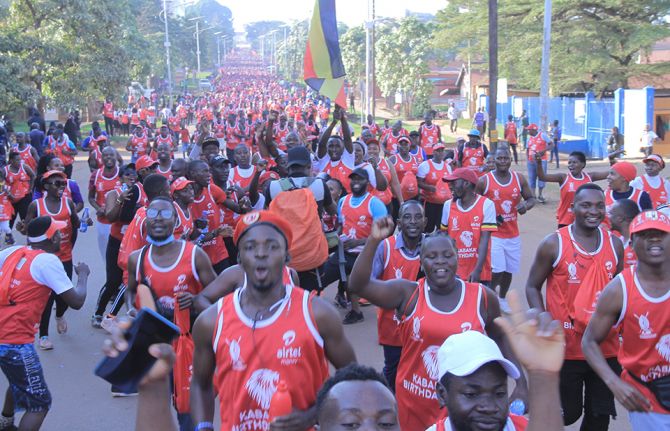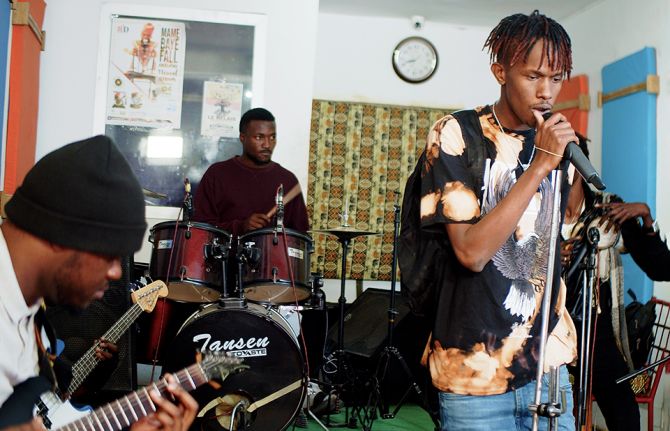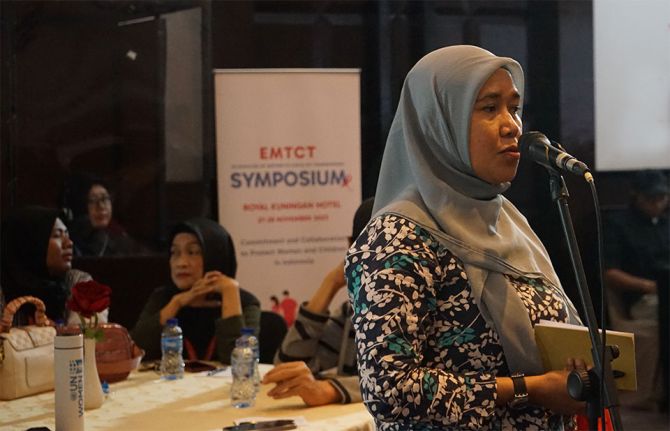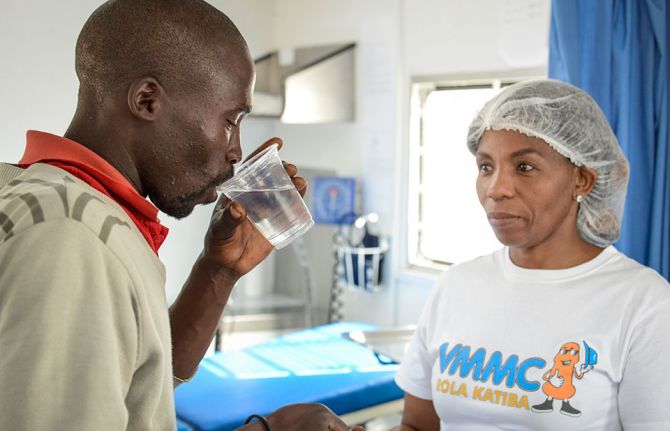
Feature Story
Joint Mission to Mali Concludes
06 May 2010
06 May 2010 06 May 2010 (L to R) UNDP Administrator Helen Clark, UNAIDS Executive Director Michel Sidibé, President of Mali Amadou Toumani Touré. 4 May 2010. Credit: UNDP
(L to R) UNDP Administrator Helen Clark, UNAIDS Executive Director Michel Sidibé, President of Mali Amadou Toumani Touré. 4 May 2010. Credit: UNDPOn the fourth and final day of their official visit to Mali, UNDP Administrator Helen Clark and UNAIDS Executive Director Michel Sidibé commended President Amadou Toumani Touré on achievements in the country’s AIDS response and said that Mali had set an example for other countries in the region to follow.
According to government estimates, about 27 000 people were receiving antiretroviral treatment in 2009, representing more than 80% of those in need. HIV prevalence in Mali declined from about 1.7% in 2001 to 1.3 % in 2006.
“I want to congratulate President Touré for leading Mali's success in the national AIDS response," said Ms Clark, in a meeting with the Malian Head of State. "These results are remarkable.”
Mr Touré, who has served as President since 2002, is Chair of Mali’s National AIDS Committee, an organization that coordinates the country’s AIDS programme. He said the Committee had succeeded in uniting all sectors in the country, including all levels of government and civil society. However, he underscored the importance of remaining vigilant in the national HIV response: “AIDS is like a boxing match. We can never let down our guard,” he said.
Mali needs to build on its success by redoubling efforts to ensure an HIV-free generation.
UNAIDS Executive Director Michel Sidibé
During the visit, Mr Sidibé reiterated his call for the elimination of mother-to-child transmission of HIV: “Mali needs to build on its success by redoubling efforts to ensure an HIV-free generation.” An estimated 12% of pregnant women in Mali received an HIV test in 2008 and, that same year, only 18% of infants born to HIV-positive women were given ARV prophylaxis to prevent mother-to-child transmission.
Ms Clark and Mr Sidibé began their mission in the ancient city of Timbuktu, where they visited Groupe d'Appui à la Formation de Base (GAFB), a local civil society organization that provides HIV prevention through innovative peer education programmes among vulnerable populations, including uniformed services, youth, and domestic workers.
“Twenty years ago when I was Minister of Health in my own county, we had the same chance that you have today in this region to stop the epidemic in its tracks,” said Ms Clark, a native of New Zealand. “We were successful because we had a very inclusive approach. Mali should be the example for other countries in Africa on how to halt the HIV epidemic."
GAFB is working to give people a voice and help the most marginalized members of society, said Mr Sidibé. "This organization is showing that we can end the HIV epidemic by focusing on those that are most vulnerable," he added.
GAFB started its activities with the support of a World Bank grant, and continues to expand its services through resources from the Global Fund. In January 2010, the Global Fund awarded Mali a two-year grant of US $43 million to intensify HIV prevention, treatment, care and support across the country.
Joint Mission to Mali Concludes
Cosponsors:
Multimedia:
Feature stories:
UNDP and UNAIDS joint mission to Mali continues (03 May 2010)
First joint mission by UNDP and UNAIDS to Mali (01 May 2010)

Feature Story
TB partners meet in Viet Nam
04 May 2010
04 May 2010 04 May 2010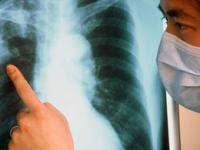 Preventing people living with HIV from dying of tuberculosis is one of the 10 priority areas outlined in the UNAIDS Outcome Framework for the period 2009-2011. Credit: UNAIDS/P.Virot
Preventing people living with HIV from dying of tuberculosis is one of the 10 priority areas outlined in the UNAIDS Outcome Framework for the period 2009-2011. Credit: UNAIDS/P.VirotThe 18th Stop TB Partnership Coordinating Board meeting is being held from 4 – 5 May 2010 in Hanoi, Viet Nam. The meeting will bring together UNAIDS and the Stop TB Partnership to strengthen their joint response to HIV/TB co-infection and to agree on a compact intended to halve TB deaths in people living with HIV by 2015.
‘One in four AIDS deaths is linked to tuberculosis. This compact represents an important milestone in ensuring that no person living with HIV dies of TB, a preventable and curable condition’ noted UNAIDS Deputy Director, Programme Paul De Lay
Every three minutes a person living with HIV dies of tuberculosis. Mortality rates have escalated (to an estimated 500,000 a year) over the past 10 years. The emergence of drug resistant strains of TB is a particularly lethal threat in populations with high rates of HIV infection.
Preventing people living with HIV from dying of tuberculosis is one of the 10 priority areas outlined in the UNAIDS Outcome Framework for the period 2009-2011. UNAIDS hopes to achieve this goal by ensuring an effective integrated delivery of services for HIV and tuberculosis as well as nutritional support in all settings.
Universal access and MDG targets for HIV and TB will be difficult, if not impossible, to achieve without greater attention to marginalized and vulnerable groups, such as prisoners, drug users, women, and migrants, and the strengthening of a human rights approach to ensure equitable access and risk-reduction.
A wide variety of participants are expected to attend the meeting, including Ministers of Health of Viet Nam, South Africa and Myanmar, the Regional Director of the World Health Organization Western Pacific Region as well as high-level representatives from UNAIDS, the Stop TB Partnership and the Global Fund to Fight AIDS, Tuberculosis and Malaria.
Discussions will range from an overview of the TB epidemic in Viet Nam and the Western Pacific Region to a review of progress in the development of new TB drugs, diagnostics and vaccines.
The Board meeting is also meant to be a follow-up from the Beijing Ministerial Meeting held in April 2009 where ministers from countries with high burden of multi-drug-resistant tuberculosis (MDR-TB) and extremely drug-resistant tuberculosis (XDR-TB) met to address the disease’s alarming threat. The 18th Stop TB Partnership Coordinating Board meeting will review the progress made by countries since Beijing and recommend further actions to overcome bottlenecks and accelerate action.
The Stop TB Partnership is a leading public-private global health partnership, established in 2001, with the aim of eliminating tuberculosis as a public health problem and, ultimately, to obtain a world free of TB. It comprises a network of more than 900 international organizations, countries, donors from the public and private sectors, governmental and nongovernmental organizations and individuals.
TB partners meet in Viet Nam
Cosponsors:
Partners:
Global Fund to Fight AIDS, Tuberculosis and Malaria
Feature stories:
Need for scale up in integrated TB and HIV screening to address linked epidemics (24 March 2009)
UNAIDS Executive Director meets with TB Programme Managers, TB civil society (26 March 2009)
External links:
Publications:
Interim Policy on Collaborative TB/HIV Activities (pdf, 285 Mb.)
Joint Action for Results: UNAIDS Outcome Framework (2009–2011) (pdf, 932 Kb.)
Tuberculosis: Guidelines for Workplace Control Activities (pdf, 223 Kb.)

Feature Story
UNDP and UNAIDS joint mission to Mali continues
03 May 2010
03 May 2010 03 May 2010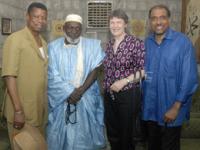 (L to R): Malik Sène, Executive Secretary of NAC, Ben Essayouti, Imam of Timbuktu, UNDP Administrator Helen Clark and UNAIDS Executive Director Michel Sidibé
(L to R): Malik Sène, Executive Secretary of NAC, Ben Essayouti, Imam of Timbuktu, UNDP Administrator Helen Clark and UNAIDS Executive Director Michel SidibéUNDP Administrator Helen Clark and UNAIDS Executive Director Michel Sidibé began their four-day mission to Mali in the ancient city of Timbuktu, where they visited Groupe d'Appui à la Formation de Base (GAFB), a local civil society organization that provides HIV prevention through innovative peer education programmes among vulnerable populations, including uniformed services, youth, and domestic workers.
“Twenty years ago when I was Minister of Health in my own county, we had the same chance that you have today in this region to stop the epidemic in its tracks,” said Ms Clark, a native of New Zealand. “We were successful because we had a very inclusive approach. Mali should be the example for other countries in Africa on how to halt the HIV epidemic."
This organization is showing that we can end the HIV epidemic by focusing on those that are most vulnerable.
UNAIDS Executive Director Michel Sidibé
Accompanying Helen Clark, Michel Sidibé said that GAFB is working to give people a voice and help the most marginalized members of society. "This organization is showing that we can end the HIV epidemic by focusing on those that are most vulnerable," said Mr Sidibé. "I am honoured to join Helen Clark on her first visit to Mali, which is a clear sign of the UN's commitment to reach zero new HIV infections.”
GAFB started its activities with the support of a World Bank grant, and continues to expand its services through resources from the Global Fund. Earlier this year, the Global Fund awarded Mali a two-year grant of US $43 million to intensify HIV prevention, treatment, care and support across the country.
In meetings with high-level government officials on May 3-4, including President Amadou Toumani Touré, the executive heads of UNDP and UNAIDS will call for an accelerated national AIDS response in the lead-up to 2015, the target date set by the international community for reaching the Millennium Development Goals. Mr Sidibé will also reiterate his call for the elimination of mother-to-child transmission of HIV. An estimated 12% of pregnant women in Mali received an HIV test in 2008 and, that same year, only 18% of infants born to HIV-positive women were given antiretrovirals to prevent HIV infection.
According to government estimates, Mali’s HIV prevalence declined from 1.7% in 2001 to 1.3 % in 2006 and about 27 000 people were receiving antiretroviral treatment in 2009, representing more than 80% of those in need. UNAIDS estimates that 100 000 people are currently living with HIV in Mali.
UNDP and UNAIDS joint mission to Mali continues
Cosponsors:
Multimedia:
Feature stories:
First joint mission by UNDP and UNAIDS to Mali (01 May 2010)

Feature Story
First joint mission by UNDP and UNAIDS to Mali
01 May 2010
01 May 2010 01 May 2010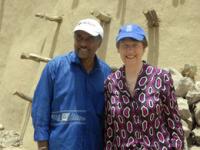
UNAIDS Executive Director Michel Sidibé and Administrator of the United Nations Development Programme (UNDP) Helen Clark during their joint mission to Mali. 01 May 2010. Credit: UNAIDS
The Administrator of the United Nations Development Programme (UNDP) Helen Clark and Executive Director of UNAIDS Michel Sidibé are on a four day mission to Mali. It is the first joint mission to Mali by these two UN agencies. Ms Clark, who is also Chair of the United Nations Development Group and Chair of the UNAIDS Committee of Cosponsoring Organizations (CCO) will call for an accelerated national AIDS response in the lead-up to 2015, the target date set by the international community for reaching the Millennium Development Goals.
The official visit will include a visit to a hospital in Timbuktu, where Ms Clark and Mr Sidibé will meet health care providers, civil society, people living with HIV and other stakeholders involved in the HIV response.
They are also scheduled to meet a number of high-level government officials, including Prime Minister Modibo Sidibé and President Amadou Toumani Touré.
Mr Sidibé will reiterate his call for preventing HIV transmission from mothers to children. Only 12% of pregnant women in Mali received an HIV test in 2008 and, that same year, 18% of infants born to HIV-positive women were given antiretrovirals to prevent HIV infection.
Earlier this year the Global Fund awarded a grant of US$ 43 million to Mail towards reaching universal access to HIV prevention, treatment, care and support.
In recent years, Mali has made considerable progress in expanding HIV prevention, treatment care and support for those in need. According to government estimates Mali’s HIV prevalence has declined from 1.7% in 2001 to 1.3 % in 2006 and in 2009 80% of people who need treatment (over 27,000) were on antiretroviral treatment. UNAIDS estimates that 100 000 people are currently living with HIV in Mali.
First joint mission by UNDP and UNAIDS to Mali
Cosponsors:

Feature Story
Advocate Gerry Elsdon: A voice and a face for TB
30 April 2010
30 April 2010 30 April 2010
(from left) Dr Mario Raviglione, Director WHO Stop TB Department; Ms Gerry Elsdon, International Federation of Red Cross and Red Crescent (IFRC) Advocate for TB, Mr Michel Sidibé UNAIDS Executive Director; and Dr Marcos Espinal, Executive Secretary of the Stop TB Partnership. Credit: UNAIDS
Gerry Elsdon was at the height of her professional career as a popular TV personality in South Africa when she was diagnosed with tuberculosis. Living in an affluent Johannesburg suburb, Gerry was shocked to find her nearest TB clinic was hidden behind a number of buildings, “as if it was something to be ashamed of”. It was this experience that prompted her to become an advocate for the rights of people affected by TB.
Nine years on, Ms Elsdon is a passionate voice speaking out about the gaps in TB services. Gerry visited the UNAIDS Secretariat headquarters on 29 April and joined a panel with Dr Mario Raviglione, Director WHO Stop TB Department and Dr Marcos Espinal, Executive Secretary of the Stop TB Partnership. The discussion with staff was chaired by Mr Michel Sidibé, executive director of UNAIDS.
Ms Elsdon is now an International Federation of Red Cross and Red Crescent (IFRC) Advocate for TB and volunteer for CHOC Childhood Cancer Foundation, the Othandweni Children’s Home and the Lilly MDR-TB Partnership.
TB is thought to be responsible for one in four deaths of HIV-positive people, yet it is a curable disease. More TB screening and treatment for people living with HIV—through fully integrated TB/HIV services—would be an important and an essential step to reduce TB’s burden on people living with HIV. It’s an approach Ms Elsdon believes would make a difference. She spoke of the value of a clinic facility where a person get be counselled and tested for HIV followed by a TB test in an adjacent room.
In 2007, there were an estimated 1.37 million new cases of tuberculosis among people living with HIV and TB was responsible for 456 000 deaths. Preventing people living with HIV dying from tuberculosis is one of the priorities in the UNAIDS Outcome Framework 2009-11.
Advocate Gerry Elsdon: A voice and a face for TB

Feature Story
Commission on AIDS in the Pacific Report launched in Suva, Fiji
30 April 2010
30 April 2010 30 April 2010
The President of Fiji, His Excellency Ratu Epeli Nailatikau receives the Commission on AIDS in the Pacific Report from Commission Chairperson and Deputy Prime Minister of Samoa, Hon. Misa Telefoni Retzlaff during the launch ceremony in Suva Fiji 26 April 2010.
The country launch of the Commission on AIDS in the Pacific Report Turning the Tide: An OPEN Strategy for a response to AIDS in the Pacific took place in Suva, Fiji on 26 April 2010. The report was presented to His Excellency President Ratu Epeli Nailatikau and representatives of the Pacific Regional organisations by Commission Chair and Samoa’s Deputy Prime Minister, Misa Telefoni Retzlaff.
Officially launched by the UN Secretary-General in New York on 2 December 2009, the report presented in Papua New Guinea on 11 March and launched in Samoa on 22 April 2010 by Tuilaepa Lupesoliai Sailele Malielegaoi, the Prime Minister of Samoa.
Turning the Tide outlines the key challenges blocking the AIDS response in the Pacific and presents decisive steps countries in the region should take to protect their societies, cultures and economies from HIV. In addition, the report states that a “one size fits all” response does not suit the diversity of Pacific nations and outdated legislation criminalizing homosexuality and commercial sex is a major impediment in the region.
According to the report, as strong family and faith-based ties are central to life in the Pacific, any hope for success addressing the epidemic depends on integrating responses to HIV within these social structures. The report also recommends that greater involvement of people living with HIV in matters of policy making and programme delivery will strengthen the response.
Within the theological bounds of their various faiths, the churches, mosques and temples have been and continue to be prominent in driving HIV Responses in the Region as powerful players in Pacific communities.
UNAIDS Regional Director for Asia and the Pacific Steve Kraus
Speaking at the Fiji launch, UNAIDS Regional Director for Asia and the Pacific Steve Kraus highlighted the Commission’s acknowledgment that without the involvement of religious communities, the responses to HIV in the Pacific would not have been as strong as they have been.
“Within the theological bounds of their various faiths, the churches, mosques and temples have been and continue to be prominent in driving HIV Responses in the Region as powerful players in Pacific communities,” said Mr Kraus.
Mr Kraus commended the World Council of Churches Pacific member churches for their powerful and insightful 2004 Nadi Declaration on HIV and the Church. The Declaration apologises for past discrimination against people living with HIV and states that the faith community is crucial in promoting community understanding of HIV issues in the Pacific by promoting greater understanding of the fundamental messages and values of love and compassion.
Focus on Pacific countries
Pacific countries are often included in broad Asia-Pacific regional groupings where the magnitude of the problem in Asian countries overshadows the challenges and needs of smaller Pacific countries.
These realities about the regions led to the constitution of an independent Commission on AIDS in the Pacific in October 2007 to examine the current scale of the HIV epidemic in the region.
There have been 29,629 reported cases of people living with HIV in the Pacific, with 5,162 new HIV diagnoses reported in 2008.
The Commission’s Report is the first document to synthesize regional and country information on epidemiology, risks and vulnerabilities, and financing and coordination of the AIDS response. Issues of rights and civil society as well as the impact of AIDS on health are also highlighted.
Commission on AIDS in the Pacific Report launched
Press centre:
HIV risks spreading further in the Pacific unless countries scale up their AIDS response (02 December 2009)
Feature stories:
Papua New Guinea launch of the Commission on AIDS in the Pacific (11 March 2010)
“HIV cannot be managed in isolation”: Pacific Commission on AIDS (02 December 2009)
Publications:
Turning the Tide: An open strategy for a response to AIDS in the Pacific (pdf 1.52 Mb.)
25th PCB: Conference Room Paper: Second Independent Evaluation 2002-2008: Pacific Region - Summary Report (pdf, 451 Kb.)

Feature Story
International conference on harm reduction in Liverpool
28 April 2010
28 April 2010 28 April 2010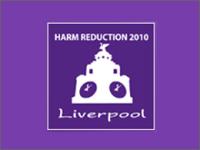
Harm Reduction 2010, the 21st International conference organized by the International Harm Reduction Association is taking place in Liverpool, England from 25 – 29 April 2010. Under the theme ‘Harm Reduction: The Next Generation’, the conference has attracted around 1400 delegates from around 80 countries to share knowledge, network and promote evidence-based best practices in the field of reducing harms from drugs and alcohol.
A wide variety of participants attending include front line workers, researchers, policy makers, politicians, people from international organizations, people who use drugs and people working in criminal justice.
UNAIDS Executive Director Michel Sidibé delivered a video message at the opening ceremony where he emphasized his call to decriminalize drug users as centerpiece for an effective response to HIV.
He also underscored that in spite of the scientific evidence showing the positive results of harm reduction programmes as well as its policy and political support, there is still a long way to go.
A study recently published in The Lancet found that injecting drug users often have little or no access to evidence-informed comprehensive HIV services. Globally, only two needles and syringes are distributed to injecting drug users per month and only 8 per cent of injecting drug users receives opioid substitution therapy.
Particular attention will be paid during the conference to the growing HIV epidemic in Eastern Europe and Central Asia which is primarily being fuelled by unsafe injecting drug use. According to UNAIDS injecting drug users are those most affected by the epidemic in the region where 1.5 million people were living with HIV in 2008, a two-thirds increase from 2001 in number of new HIV infections. HIV is also spreading to the sexual partners of people who inject drugs.
After a slow start many countries in the region have made a big push for harm reduction. For example Ukraine has the highest HIV infection level in Europe and a third of injecting drug users are living with HIV. But in recent years the HIV epidemic among drug users has stabilized in the country due to a scale-up in needle and syringe exchange and, more recently, drug substitution programs.
Many studies have shown that when harm reduction services reach drug users they reduce needle sharing, and opioid substitution therapy reduces risk taking and deaths. Another large study conducted in more than 100 cities shows that where harm reduction is available, HIV infection rate reduces by nearly 19% and where it is not, it increases by 8%.
Effective harm reduction approaches include access to clean needles, opioid substitution therapy for opiate users, access to antiretroviral therapy and reducing sexual transmission of HIV from drug users to their sexual partners through condom promotion.
The 2010 Harm Reduction conference includes high profile keynote speeches, plenary sessions, symposia, workshops, training events, a film festival, poster exhibitions, exhibition areas, satellite meetings, social and networking events, and the annual IHRA award presentations. Also, a ground breaking report on the global lack of funding for HIV-related harm reduction titled 3 Cents a day is not enough was launched at the conference.
International conference on harm reduction in Liv
Key populations:
People who use injecting drugs
People living with HIV
Multimedia:
Feature stories:
Call for urgent action to improve coverage of HIV services for injecting drug users (10 March 2010)
Lack of resources could undermine gains made in the HIV response in Pakistan (05 February 2010)
OPINION: HIV and drugs: two epidemics - one combined strategy (20 April 2009)
UNODC and Iran sign agreements to reduce vulnerability of women and Afghan refugees to drugs and HIV (24 March 2009)
Injecting drug use and HIV: Interview with UNAIDS Team Leader, Prevention, Care and Support team (11 march 2009)
External links:
Related

Feature Story
West Indies cricketer Ramnaresh Sarwan new champion for HIV advocacy
27 April 2010
27 April 2010 27 April 2010
West Indies cricketer Ramnaresh Sarwan Credit: Getty Images
In conjunction with the International Cricket Council (ICC), West Indies cricketer Ramnaresh Sarwan was unveiled as a new Think Wise Champion on 26 April as part of a global cricket partnership to raise awareness of HIV.
He joins high profile cricketers Graeme Smith, Kumar Sangakkara and Virender Sehwag, as well as West Indies colleague Stafanie Taylor, in becoming a Champion for the ICC’s partnership with UNAIDS, UNICEF and the Global Media AIDS Initiative.
The global partners are also working with the Caribbean Broadcast Media Partnership on HIV/AIDS as part of the ‘Live UP’ campaign to coincide with the cricket tournament ICC World Twenty20 2010, which takes place from 30 April-16 May. This initiative encourages young people in the region to take positive action by informing themselves about the facts about HIV, getting tested and protecting themselves.
The issue of HIV is an important one for young people in the Caribbean and hopefully I can use my profile as an international cricketer to have a positive impact on people’s behavior within the region.
West Indies Cricketer Ramnaresh Sarwan
Sarwan (29) is one of the leading batsmen in the West Indies team, having made 83 Test and 154 ODI appearances to date. In that time, he has scored 15 Test centuries and four ODI hundreds to date.
“The issue of HIV is an important one for young people in the Caribbean and hopefully I can use my profile as an international cricketer to have a positive impact on people’s behavior within the region,” said Ramnaresh Sarwan.
“It is important young people are aware of resources that exist for them, such as the Live UP website, www.iliveup.com where they can find out about HIV, learn the importance of protection, and understand how to talk about these issues to their partner and friends.
“By using this event to raise awareness of HIV and remind cricket supporters not to discriminate against people with the disease, hopefully we can play our role in educating young people.”
A series of awareness activities will take place during the course of the ICC World Twenty20 2010 including community interactions between leading players and local community groups in Barbados, Guyana, St Kitts and St Lucia. The players will wear red ribbons as a show of support for people living with HIV in the semi-finals and final and public service announcements will be played on the big screen at matches.
This public service announcement, which features leading Caribbean celebrities and Stafanie Taylor is part of the Caribbean Broadcast Media Partnership’s ‘Live UP’ campaign that is being aired by 95 top broadcast media houses across 24 countries in the Caribbean.
Top Caribbean musical artists Alison Hinds, Bunji Garlin, Claudette Peters, Fay Ann Lyons and Mr Vegas, as well as Kim Collins, the St Kitts sprinter who won 100m gold at 2003 World Athletics Championships in Paris, are among those who deliver a message about HIV in a 30-second advert which has been shown across the Caribbean since last month.
The partnership between UNAIDS and ICC began in September 2003 when they first teamed up to bring messages of HIV prevention to young people across cricket playing nations. In 2006 UNICEF also joined the partnership which now also supports the “Unite for Children, Unite against AIDS” campaign.
West Indies cricketer Ramnaresh Sarwan new champi
Cosponsors:
Feature stories:
ICC and UNAIDS celebrate partnership and look to future (17 November 2008)
External links:

Feature Story
UNAIDS Executive Director joins President Zuma to launch national HIV counselling and testing drive in South Africa
26 April 2010
26 April 2010 26 April 2010
UNAIDS Executive Director Michel Sidibé joined the President of South Africa Jacob Zuma (right)for the launch on 25 April 2010. Credit: UNAIDS/A. Vlachakis
UNAIDS Executive Director Michel Sidibé was invited by the South African government to join in the launch of a new testing campaign with President Jacob Zuma, Health Minister Aaron Motsoaledi, Premier Nomvula Mokonyane and civil society representatives Vuyiseka Dubula from the Treatment Action Campaign and Nkululeko Nxesi from the National Association of People living with AIDS.
Some 2000 people were on hand at the Natalspruit hospital in Erkuhuleni, Johannesburg. In his address at the launch, Mr Sidibé applauded President Zuma and Minister Motsoaledi for their leadership and commitment to the HIV response in South Africa, and for the unprecedented mobilization of the nation to know their HIV status.
This campaign is the biggest national mobilization in South Africa around any one single issue since the end of apartheid. Testing 15 million people by the end of 2011 is the largest programme scale-up in the world we have seen so far. It is historic.
Michel Sidibé, UNAIDS Executive Director
Mr Sidibé noted: “This campaign is the biggest national mobilization in South Africa around any one single issue since the end of apartheid. Testing 15 million people by the end of 2011 is the largest programme scale-up in the world we have seen so far. It is historic.” He went on to say that South Africa was “writing a new page in the story of Africa by being the architects of the end of the HIV tragedy.”
In his statement, President Zuma disclosed his negative HIV status and encouraged South African citizens to test regularly. He stressed that the disclosure of one’s status was an individual decision and not mandatory.
The President implored the people of South Africa to change their attitudes about the epidemic and the stigma attached to HIV. He mentioned that stigma arose from ignorance, and that the benefit of the voluntary HIV Counselling and Testing campaign is its capacity to educate people about HIV and to promote the rights and dignity of people living with HIV.
The ceremony included the launch of the HIV Counselling and Testing campaign song, which was performed by Choome and Arthur Mopokane, two of South Africa’s popular singers, as well as a performance by the traditional musician Ihashi Elimhlophe.
The launch concluded with Mr Sidibé, Minster Motosaledi, Premier Mokonyane and other South African leaders testing for HIV.
South Africa’s HIV Counselling and Testing campaign is the largest HIV counselling and testing scale-up in the history of the HIV epidemic. The campaign aims to test 15 million people for HIV and to expand access to antiretroviral treatment to 80% of those in need by 2011.
South Africa has the world's largest population of people living with HIV; an estimated 5.7 million people in the country are living with HIV, representing nearly one sixth of the global disease burden. Approximately 18% of adults in South Africa are infected with HIV.
UNAIDS Executive Director joins President Zuma to
Press centre:
South Africa launches massive HIV prevention and treatment campaign (25 April 2010)
Speeches:
Read speech by UNAIDS Executive Director for the national launch of the HIV counselling and testing campaign in South Africa (25 April 2010)
Multimedia:
Related

Feature Story
New WHO strategy calls for elimination of HIV in children by 2015
21 April 2010
21 April 2010 21 April 2010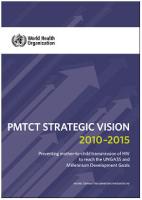
Preventing mother-to-child transmission of HIV (PMTCT) is one of the key pillars in the worldwide response to the AIDS epidemic and one of the priorities of UNAIDS Secretariat and its Cosponsors. The World Health Organization (WHO) has recently published a strategy paper outlining its commitment to support country-level and global efforts to scale up PMTCT services and to integrate such services into maternal, newborn and child health programmes.
Preventing mothers from dying and babies from becoming infected with HIV is one of UNAIDS’ key priority areas as outlined in its . The new PMTCT strategic vision 2010–2015: preventing mother-to child transmission of HIV to reach the UNGASS and Millennium Development Goals, reflects an important part of WHO’s health sector response to HIV and will contribute directly towards achieving the results of the Outcome Framework.
As a UNAIDS cosponsor which co-leads efforts to prevent mother-to-child HIV transmission within the United Nations, along with cosponsor UNICEF, WHO will use the PMTCT strategic vision to accelerate global support for prevention of mother-to-child HIV transmission.
The strategy paper urges the international community to set new, more ambitious targets that promote progress towards the virtual elimination of paediatric HIV by 2015. It also calls for greater collaboration with partners, such as the Global Fund to fight AIDS, Tuberculosis and Malaria, and the US President’s Emergency Plan for AIDS Relief (PEPFAR).
Significant progress in PMTCT has occurred in recent years and in 2008 around 45% of pregnant women living with HIV in low- and middle-income countries received antiretroviral drugs to prevent mother-to-child transmission of HIV. This is in contrast to only 10% in 2004.
Despite these successes, coverage levels of PMTCT services are still low in a number of resource-limited countries and communities. According to the UNAIDS/WHO AIDS Epidemic Update 2009 an estimated 430,000 children were newly infected with the virus in 2008, more than 90% of them through vertical transmission from their mothers. Without treatment, around half of these children will die before their second birthday.
But mother-to-child transmission is almost entirely preventable where services are accessible, and PMTCT interventions can reduce the risk of infection to less than 5%.
The PMTCT strategic vision can help address this by promoting a comprehensive approach that includes the following four components: primary prevention of HIV infection among women of childbearing age; preventing unintended pregnancies among women living with HIV; preventing transmission from an HIV-positive woman to her infant; and providing appropriate treatment, care and support to mothers living with HIV and their children and families.
The new document highlights a series of needed strategic directions:
- Strengthen commitment and leadership to achieve full coverage of PMTCT services
- Provide technical guidance to optimize HIV services for women and children
- Promote and support integration of HIV interventions within maternal, newborn and child health and reproductive health programmes
- Ensure equitable access for all women, including the most vulnerable
- Support health systems interventions to improve service delivery
- Track programme performance and impact
- Strengthen global, regional and country partnerships and advocate for increased resources.
The publication provides a number of country and regional examples. In Asia, several nations have begun linking HIV services with reproductive, adolescent, maternal, newborn and child health services.
Along the same lines, the elimination of mother-to-child transmission of HIV and congenital syphilis in Latin America and the Caribbean (affecting some 6,000 children and 450, 000 pregnancies each year respectively) has been defined as a top priority by the WHO Regional Office for the Americas and UNICEF. Together with partners, they have recently launched a campaign with the objective to eliminate mother-to-child transmission of HIV by 2015.
The PMTCT strategic vision also shows that interventions needed vary depending on country or regional circumstances. In Eastern Europe, for instance, emphasis is not on general population interventions but on improving PMTCT services for key populations at higher risk such as injecting drug users and their partners.
It is clear that whatever the context, the need to eliminate mother-to-child transmission of HIV is of paramount necessity. The PMTCT strategic vision is designed to be a key tool to strengthen WHO's support to this global effort to save lives and protect the health of the world’s women and children.
New WHO strategy calls for elimination of HIV in
Cosponsors:
Feature stories:
UNAIDS and Private sector meet to explore collaboration towards virtual elimination of mother-to-child transmission (16 March 2010)
Global Fund projects that UNAIDS’ call for elimination of mother–to-child HIV transmission by 2015 is within reach (08 March 2010)
Data shows progress needed on HIV testing and treatment for children and mothers (30 November 2009)
Partnering with faith based organizations for virtual elimination of mother to child transmission of HIV (14 October 2009)
More infants protected from HIV as access to antiretroviral drugs to prevent mother-to-child transmission increases (30 September 2009)
Early diagnosis and treatment save babies from AIDS-related death (27 May 2009)








